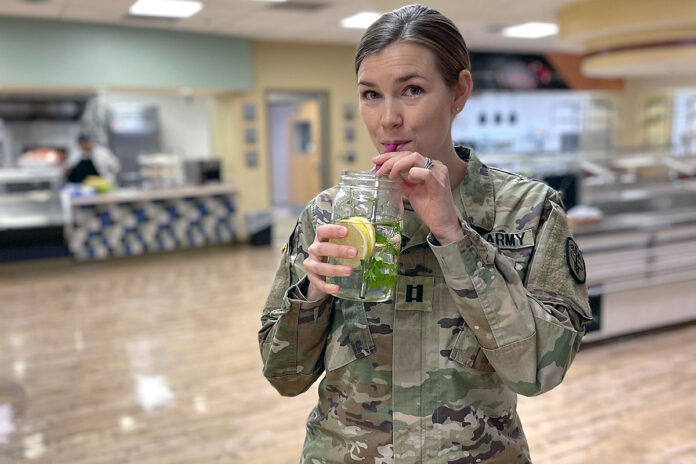 Fort Campbell, KY – With temperatures reaching higher and higher lately, one of the most important things to keep in mind is proper hydration. Despite the variety of consequences dehydration has, it can be all too easy to forget to drink enough water.
Fort Campbell, KY – With temperatures reaching higher and higher lately, one of the most important things to keep in mind is proper hydration. Despite the variety of consequences dehydration has, it can be all too easy to forget to drink enough water.
“Water is the primary component of our bodies,” said Capt. Caitlyn Shaver, chief of Clinical Nutrition at Blanchfield Army Community Hospital, Fort Campbell, Kentucky. “It’s used in digestion. It helps us break down our food. It helps us move our food from our intestines into our bloodstream. It then helps us get that into our cells and utilize it for energy.”
“It helps everything,” she explained.
Those familiar with the survival rule of threes will know that water is even more crucial to the body than food.
While you may have been told 8 cups of water daily is ideal, the recommended amount of fluids actually varies person-to-person based on a few factors.
Shaver provided a general baseline of 3.7 liters of fluid a day for men and 2.7 for women, though she made sure to note this amount can be affected by age, body composition and activity, among other things. Additionally, some of these fluids can come from foods as well.
“You’ll need extra fluids if you’re at higher altitudes or in a humid climate, as well as if you’re sweating a lot,” she said.
While you might be worried about overshooting your water intake, Shaver noted that over-hydrating is not common.
Early symptoms of dehydration include thirst and dry mouth. Urine is also a great indicator of hydration, with lighter and clearer results being preferable. Darker and infrequent urine is a sign to drink water immediately. Fatigue, headaches, and dizziness are other possible markers of dehydration.
Shaver said that drinks other than water contribute to your daily fluid goal to an extent, especially drinks like sparkling waters and teas. However, she noted that caffeinated drinks like coffee, soda and energy drinks can cause fluid loss in excess due to the diuretic effects of caffeine, so one should focus on drinks without caffeine and low in sugar.
“Since water is caffeine and calorie free, it makes for a great first choice,” she said.
Shaver said that she personally believes that many people are unaware of their low fluid intakes. Because water is often overlooked, many of the symptoms of dehydration, like headaches, may be chalked up to other factors. “They might blame it on lack of sleep, or a lack of caffeine or something else before they think about hydration status. Feelings of hunger caused by low fluids can also be misinterpreted as actual hunger.”
Blanchfield Soldier Sgt. Sangoh Choi, a behavioral health specialist, estimated that he drinks around 2 liters of water daily, and tries to keep hydration in mind at all times throughout his day.
“I’ve seen people getting heat injuries and it wasn’t pretty at all. That’s why I try to drink a lot of water even when I’m not working out,” said Choi.
There are a variety of ways to increase your water intake, and Shaver recommends trying to make it more fun. She mentioned adding wedges of lime or lemon, sprigs of mint or fruit to change the taste.
“Finding a bottle you like and refilling it throughout the day, or even setting alarms to remind yourself to drink is worth a try especially in this heat,” said Shaver. “Even something as simple as congratulating yourself for making a healthy, easy, yet often forgotten choice can be effective.”



